八年级下册英语语法
- 格式:doc
- 大小:143.50 KB
- 文档页数:37
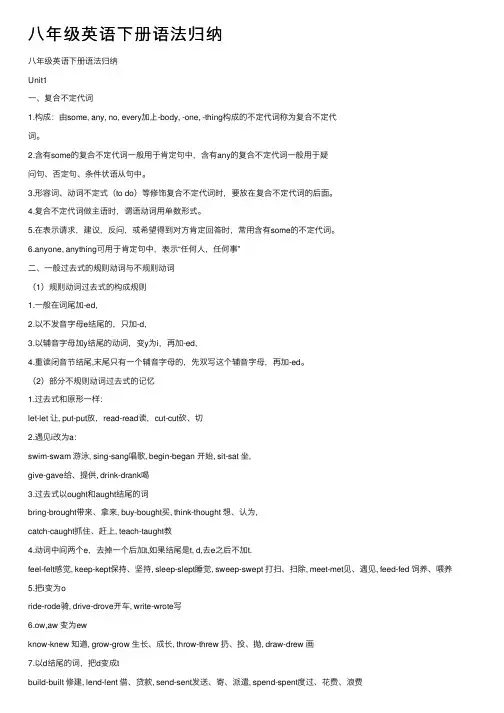
⼋年级英语下册语法归纳⼋年级英语下册语法归纳Unit1⼀、复合不定代词1.构成:由some, any, no, every加上-body, -one, -thing构成的不定代词称为复合不定代词。
2.含有some的复合不定代词⼀般⽤于肯定句中,含有any的复合不定代词⼀般⽤于疑问句、否定句、条件状语从句中。
3.形容词、动词不定式(to do)等修饰复合不定代词时,要放在复合不定代词的后⾯。
4.复合不定代词做主语时,谓语动词⽤单数形式。
5.在表⽰请求,建议,反问,或希望得到对⽅肯定回答时,常⽤含有some的不定代词。
6.anyone, anything可⽤于肯定句中,表⽰“任何⼈,任何事”⼆、⼀般过去式的规则动词与不规则动词(1)规则动词过去式的构成规则1.⼀般在词尾加-ed,2.以不发⾳字母e结尾的,只加-d,3.以辅⾳字母加y结尾的动词,变y为i,再加-ed,4.重读闭⾳节结尾,末尾只有⼀个辅⾳字母的,先双写这个辅⾳字母,再加-ed。
(2)部分不规则动词过去式的记忆1.过去式和原形⼀样:let-let 让, put-put放,read-read读,cut-cut砍、切2.遇见i改为a:swim-swam 游泳, sing-sang唱歌, begin-began 开始, sit-sat 坐,give-gave给、提供, drink-drank喝3.过去式以ought和aught结尾的词bring-brought带来、拿来, buy-bought买, think-thought 想、认为,catch-caught抓住、赶上, teach-taught教4.动词中间两个e,去掉⼀个后加t,如果结尾是t, d,去e之后不加t.feel-felt感觉, keep-kept保持、坚持, sleep-slept睡觉, sweep-swept 打扫、扫除, meet-met见、遇见, feed-fed 饲养、喂养5.把i变为oride-rode骑, drive-drove开车, write-wrote写6.ow,aw 变为ewknow-knew 知道, grow-grow ⽣长、成长, throw-threw 扔、投、抛, draw-drew 画7.以d结尾的词,把d变成tbuild-built 修建, lend-lent 借、贷款, send-sent发送、寄、派遣, spend-spent度过、花费、浪费Unit2频度副词1.表⽰次数、频率的副词称为频度副词。
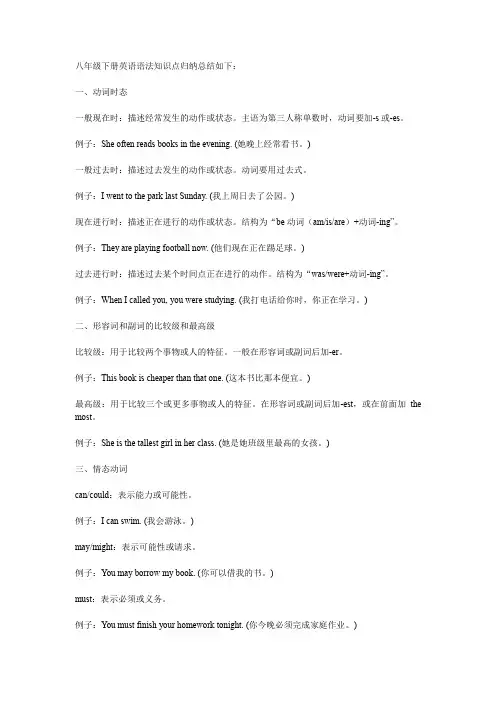
八年级下册英语语法知识点归纳总结如下:一、动词时态一般现在时:描述经常发生的动作或状态。
主语为第三人称单数时,动词要加-s或-es。
例子:She often reads books in the evening. (她晚上经常看书。
)一般过去时:描述过去发生的动作或状态。
动词要用过去式。
例子:I went to the park last Sunday. (我上周日去了公园。
)现在进行时:描述正在进行的动作或状态。
结构为“be动词(am/is/are)+动词-ing”。
例子:They are playing football now. (他们现在正在踢足球。
)过去进行时:描述过去某个时间点正在进行的动作。
结构为“was/were+动词-ing”。
例子:When I called you, you were studying. (我打电话给你时,你正在学习。
)二、形容词和副词的比较级和最高级比较级:用于比较两个事物或人的特征。
一般在形容词或副词后加-er。
例子:This book is cheaper than that one. (这本书比那本便宜。
)最高级:用于比较三个或更多事物或人的特征。
在形容词或副词后加-est,或在前面加the most。
例子:She is the tallest girl in her class. (她是她班级里最高的女孩。
)三、情态动词can/could:表示能力或可能性。
例子:I can swim. (我会游泳。
)may/might:表示可能性或请求。
例子:You may borrow my book. (你可以借我的书。
)must:表示必须或义务。
例子:You must finish your homework tonight. (你今晚必须完成家庭作业。
)四、被动语态被动语态用于描述事物的状态或描述被动发生的动作。
结构为“be动词(am/is/are/was/were)+动词的过去分词”。
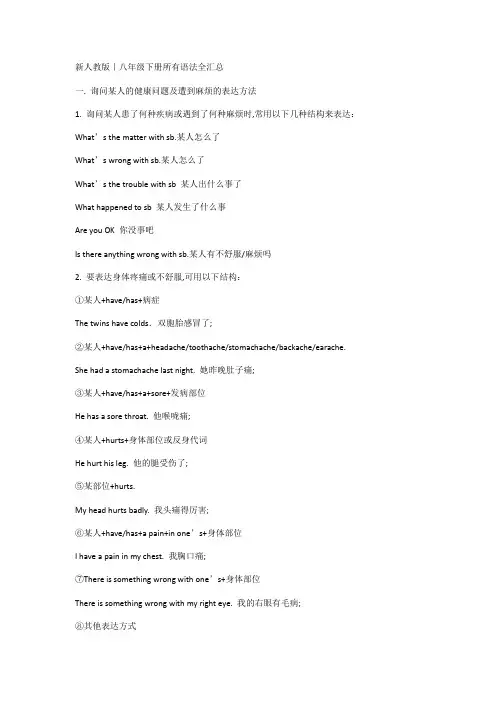
新人教版|八年级下册所有语法全汇总一. 询问某人的健康问题及遭到麻烦的表达方法1. 询问某人患了何种疾病或遇到了何种麻烦时,常用以下几种结构来表达:What’s the matter with sb.某人怎么了What’s wrong with sb.某人怎么了What’s the trouble with sb 某人出什么事了What happened to sb 某人发生了什么事Are you OK 你没事吧Is there anything wrong with sb.某人有不舒服/麻烦吗2. 要表达身体疼痛或不舒服,可用以下结构:①某人+have/has+病症The twins have colds.双胞胎感冒了;②某人+have/has+a+headache/toothache/stomachache/backache/earache. She had a stomachache last night. 她昨晚肚子痛;③某人+have/has+a+sore+发病部位He has a sore throat. 他喉咙痛;④某人+hurts+身体部位或反身代词He hurt his leg. 他的腿受伤了;⑤某部位+hurts.My head hurts badly. 我头痛得厉害;⑥某人+have/has+a pain+in one’s+身体部位I have a pain in my chest. 我胸口痛;⑦There is something wrong with one’s+身体部位There is something wrong with my right eye. 我的右眼有毛病;⑧其他表达方式She has a heart trouble. 她有心脏病;He got hit on the head. 他头部受到了撞击;She cut her finger. 她割破手指了;二. 情态动词should的用法1. should为情态动词,意为“应该;应当”,否定式为shouldn’t,其后接动词原形,无人称和数的变化;常用来表示征询意见、建议、劝告、要求或义务等;You should drink more water. 你应该多喝水;He should put his head back. 他应该把头后仰;We should try our best to help him. 我们应当尽力去帮助他; You shouldn‘t watch TV. 你不应该看电视;2. should用于主语为第一人称的疑问句,表示征询意见;Should I put some medicine on it 我应当给它敷上药吗Should we tell her about it 我们应该告诉她这件事吗3. 在英语中,表示建议的说法有很多,而且都是中考考查的重点;主要结构有:①Would you like to do sth你想要/愿意做某事吗Would you like to play basketball with me 你想要和我一起打篮球吗②Shall I/we do sth 我/我们做某事好吗Shall we go to the zoo tomorrow 明天我们去动物园,好吗③Why not do sth 为什么不......呢Why not join us为什么不加入到我们当中来呢④How/What about doing sth 做某事怎么样How about going swimming 去游泳怎么样⑤Let’s do sth. 让我们做......吧;Let’s go home. 咱们回家吧;⑥You’d better not do sth 你最好不要做某事;You’d better not go there alone. 你最好不要一个人去那儿;三. 反身代词英语中共有八个反身代词,在使用时应注意和它所指的相应的对象在人称、性别和数上保持一致;第一人称第二人称第三人称单数myself yourself himself/herself/itself复数ourselves yourselves themselves反身代词的用法1. 可用作宾语,指的是宾语和主语表示同一个或同一些人或事物;如:Maria bought herself a scarf.We must look after ourselves very well.2. 可用作表语,指的是表语和主语表示同一个或同一些人或事物;如:She isn’t quite herself today.3. 可用作主语或宾语的同位语,常用来加强语气;如:She herself will fly to London tomorrow.I met the writer himself last week.4. 用在某些固定短语当中;如:look after oneself / take care of oneself 照顾自己teach oneself sth./learn sth. by oneself 自学enjoy oneself 玩得高兴,过得愉快help oneself to sth 请自用……随便吃/喝些……hurt oneself 弄伤自己say to oneself 自言自语leave sb. by oneself 把某人单独留下注意反身代词不能单独做主语,但可以做主语的同位语,起强调作用;如:我自己能完成作业;误Myself can finish my homework.正I myself can finish my homework. / I can finish my homework myself.四. 一般将来时一般将来时表示将来某个时间要发生的动作或状态,或将来经常发生的动作或状态; 一般将来时的基本结构1. will+动词原形否定式:will not=won't一般疑问式:will/shall+主语+动词原形+其他特殊疑问式:特殊疑问词+一般疑问式—Will he help you with your English tonight今天晚上他会帮助你学习英语吗—Yes, he will./No, he won't.是的,他会;/不,他不会;—When will you arrive for America你什么时候去美国—Tomorrow.明天;2. am/is/are going to +动词原形否定式:am/is/are not going to +动词原形一般疑问式:am/is/are +主语+ going to + 动词原形+其他特殊疑问式:特殊疑问词+一般疑问式Look at the dark clouds. There is going to be a storm.看那乌云,快要下雨了;Is he going to collect any data for us他会帮我们收集数据吗What are you going to do tomorrow明天你打算作什么3. will+动词原形与am/is/are going to +动词原形的用法区别will+动词原形与am/is/are going to +动词原形的用法虽然都表示将来发生动作或情况,一般情况下能互换;但它们的用法是有区别的;will主要用于在以下三个方面:1表示主观意愿的将来;They will go to visit the factory tomorrow.明天他们将去厂参观工厂;2表示不以人的意志为转移的客观的将来;He will be thirty years old this time next year.明年这个时候他就将三十岁;3表示临时决定,通常用于对话中;—Mary has been ill for a week.玛丽病了一周了;—Oh, I didn't know. I will go and see her.噢,我不知道;我去看看她;be going to主要用于以下两个方面:1表示事先经过考虑、安排好打算、计划要做某事;Dad and I are going to watch an opera this afternoon.今天下午我和爸爸打算去看歌剧;2表示根据目前某种迹象判断,某事非常有可能发生,表示推测;Look There come the dark clouds. It is going to rain.瞧乌云密集;天要下雨了;五. 动词不定式to do的用法1. 作主语为避免句子的头重脚轻,常用it作为形式主语,而真正的主语动词不定式后置;常用句型:It +be+adj./n.+for/of sb. to do sth./It takes sb. some time to do sth.2. 作宾语动词want, decide, hope, ask, agree, choose, learn, plan, need, teach, prepare常接动词不定式作宾语;3. 作后置定语常用于“have/has+sth.+to do”或“Its time to do sth.”等结构中;4. 作宾语补足语tell, ask, want, invite, teach, like, call等可接带to的动词不定式作宾语补足语,构成tell/ask/want /call/invite sb. to do sth.结构;注意动词不定式作使役动词和感官动词的宾语补足语时应省去to:“一感feel,二听listen to, hear,三让let, make, have,四看look at, see, watch, notice,半帮助help”;5. 动词不定式作状语主要用来修饰动词,表示目的,结果或原因;为了强调目的,有时可以把动词不定式放在句首,或在不定式前加in order to 或so as to “为了,目的是”;六. Could you please...句型1. 请求别人时通常用此句型,也可以说Can you...please情态动词could或can在这里均表示请求,在意思上无区别,但是用could在于其显得更委婉、客气、诚恳;在日常生活中常使用could you/I...若在句末加上please,则显得更礼貌;Could you help me find my book, please你能帮我找到我的书吗2. 对could you/I...的问句作出肯定回答,常用“sure/certainly/of course”等;如果作否定回答,常用“sorry或oh, please don’t”; 一般不用no开头,用no显得语气生硬、不礼貌;3. 表示请求的其他句式Would you like to do...Would you mind doing...Let’s do....Please do...祈使句前加please七. 过去进行时1. 基本概念:过去进行时表示在过去某一时刻或一段时间内正在进行的动作;这一特定的过去时间除有上下文暗示以外, 一般用时间状语来表示;常用的时间状语this morning, the whole morning, all day yesterday, from nine to ten last evening, when, while等;We were watching TV from seven to nine last night.昨天晚上七点到九点的时候我们在看电视;It was raining when they left the station.他们离开车站的时候天正在下雨;2. 基本结构was / were not + 动词-ing3. 一般过去时与过去进行时用法的比较一般过去时表示在过去某个时间发生过的动作或存在的状态, 而过去进行时则表示在过去某一时刻或某一段时间正在进行的动作;David wrote a letter to his friend last night. 大卫昨晚给他的朋友写了封信;信写完了;David was writing a letter to his friend last night. 大卫昨晚一直在给他的朋友写信;信不一定写完;八. 状语从句1. unless引导条件状语从句unless = if...not... 除非,若不They will go tomorrow unless it rains.= They will go tomorrow if it doesn’t rains.2. as soon as引导时间状语从句,意为“一...就...”;He will come and see you as soon as he can.3. so...that...引导结果状语从句句型1:主语+谓语+so+形容词/副词+that从句The wind was so strong that we could hardly move forward. 句型2:so +形容词+ a/an + 单数名词+ that从句It was so hot a day that they all went swimming.句型3. so + many/ few + 复数名词+ that从句He has so few friends that he often feels lonely.句型4:so +much/ little + 不可数名词+ that 从句I had so little money that I couldn’t buy a pen.九. 形容词/副词的比较等级形容词和副词有三个比较等级,即原级也就是原形、比较级表示“较……”或“更……”的意思,用于两者之间比较和最高级表示“最……”的意思,用于三者或三者以上的比较;1. 形容词/副词的比较级和最高级的规则变化1单音节词和少数以-er,-ow结尾的双音节单词,比较级在后面加-er,最高级在后面加-est;①单音节单词small→smaller→smallestshort→shorter→shortesttall→taller→tallestgreat→greater→greatest②少数以-er,-ow结尾的双音节单词clever→cleverer→cleverestnarrow→narrower→narrowest2以不发音e结尾的单音节单词,比较级在原形后加-r,最高级在原级后加-st;large→larger→largestnice→nicer→nicestable→abler→ablest3以一个辅音字母结尾的闭音节即:辅音+元音+辅音单词中,先双写末尾的辅音字母,比较级加-er,最高级加-est;big→bigger→biggesthot→hotter→hottestfat→fatter→fattest4以“辅音字母+y”结尾的双音节词, 把y改为i,比较级加-er,最高级加-est; easy→easier→easiestheavy→heavier→heaviestbusy→busier→busiesthappy→happier→happiest5其他双音节词和多音节词,比较级在前面加more,最高级在前面加most; beautiful→more beautiful→most beautifuldifferent→more different→most differenteasily→more easily→most easily2. 形容词/副词的比较级和最高级的不规则变化good→better→bestwell→better→bestbad→worse→worstill→worse→worstold→older/elder→oldest/eldestmany/much→more→mostlittle→less→leastfar →further/farther→furthest/farthest3. 原级常用句型1A is as+原级+ as+ B 表示A与B一样...eg. He is as tall as me.2A is not as/so +原级+ as B 表示A不如B...eg. He is not as tall as me.3只能修饰原级的词,very,quite,so,too,so,enough,pretty等;eg. He is too tired to walk on.他太累了以至于不能再继续走了;4. 比较级常用句型1当句中有than时则用比较级;eg. He is fatter than me.2“特殊疑问词+be+形容词比较级,A or B ”eg. Which is bigger,the earth or the moon哪一个更大,地球还是月球3“比较级+and+比较级”表示“越来越...”;eg. The flowers are more and more beautiful.花儿越来越漂亮;English is more and more important. 英语越来越重要了;4“the+比较级,the+比较级”表示“越...,越...”;eg. The more careful you are,the fewer mistakes you’ll make.5可以修饰比较级的词:much,a lot,far,a little,a bit,even,still等;eg. Lesson One is much easier than Lesson Two. 第一课比第二课容易得多;5. 最高级常用句型1.“主语+be+the+形容词最高级+单数名词+in/of...”表示“……是……中最……的”;Tom is the tallest in his class/of all the students.汤姆是他们班上/所有学生当中最高的;2.“主语+实意动词+the+副词最高级+in/of...”表示“……是……中最……的”;I jump the farthest in my class.我是我们班跳得最远的;3.“主语+be+one of the+形容词最高级+复数名词+in/of...”表示“……是……中最……之一”; Beijing is one of the largest cities in China.北京是中国最大城市之一;4.“特殊疑问词+be+the+最高级,甲,乙,or丙”用于三者或三者以上的比较;Which country is the largest,China,Brazil or Canada哪个国家最大,中国,巴西还是加拿大5.“特殊疑问词+助动词+主语+the+副词最高级+甲,乙,or丙”用于三者或三者以上的比较; Which season do you like the best,spring,summer or autumn你最喜欢哪一个季节,春天,夏天还是秋天注意:副词最高级用在句中时,其前可以加the,也可以不加;但形容词最高级用在句中时,其前一般都要加the;十. 现在完成时一. 现在完成时基本结构①肯定句:主语+have/has+动词的过去分词②否定句:主语+have/has+not+动词的过去分词③一般疑问句:Have/Has+主语+动词的过去分词④特殊疑问句:特殊疑问词+一般疑问句have/has+主语+过去分词二. 现在完成时用法1. 现在完成时用来表示过去已经完成的动作对现在造成影响或后果;也就是说,动作或状态发生在过去但它的影响现在还存在,强调的是现在;I have already posted the photo.我已经邮寄出了照片;与此种用法连用的时间状语时一些模糊的过去时间状语,如already肯定句, yet否定句/疑问句, just, before, recently,still, lately,never等;2. 现在完成时也可用来表示动作或状态发生在过去某一时刻,持续到现在并且有可能会继续持续下去;He has lived here since 1978.自从1978年以来,他一直住在这儿;动作起始于1978年,一直住到现在,可能还要继续住下去;此种用法常与for+时间段,since+时间点或过去时的句子连用;谓语动词必须是延续性动词;有些瞬间动词可变为延续动词:go out----be outfinish----be overopen----be opendie----be deadbuy---havefall ill---be illcome back----be back catch a cold----have a cold。
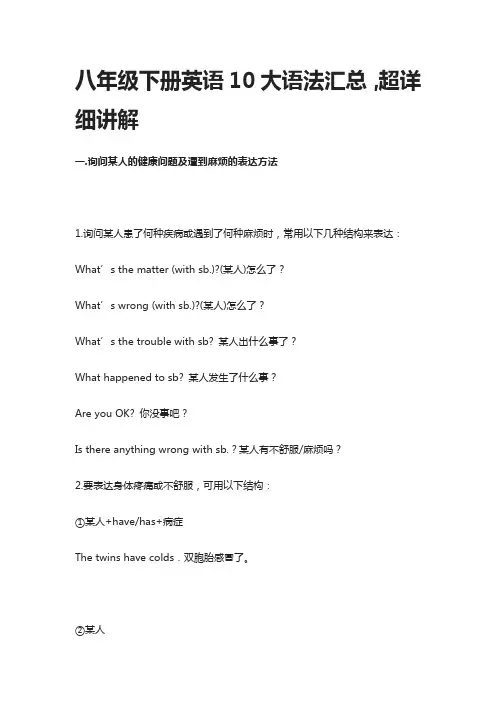
八年级下册英语10大语法汇总,超详细讲解一.询问某人的健康问题及遭到麻烦的表达方法1.询问某人患了何种疾病或遇到了何种麻烦时,常用以下几种结构来表达:What’s the matter (with sb.)?(某人)怎么了?What’s wrong (with sb.)?(某人)怎么了?What’s the trouble with sb? 某人出什么事了?What happened to sb? 某人发生了什么事?Are you OK? 你没事吧?Is there anything wrong with sb.?某人有不舒服/麻烦吗?2.要表达身体疼痛或不舒服,可用以下结构:①某人+have/has+病症The twins have colds.双胞胎感冒了。
②某人+have/has+a+headache/toothache/stomachache/backache/earache. She had a stomachache last night.她昨晚肚子痛。
③某人+have/has+a+sore+发病部位He has a sore throat.他喉咙痛。
④某人+hurt(s)+身体部位或反身代词He hurt his leg.他的腿受伤了。
⑤某部位+hurt(s).My head hurts badly.我头痛得厉害。
⑥某人+have/has+a pain+in one’s+身体部位I have a pain in my chest.我胸口痛。
⑦(There is) something wrong with one’s+身体部位There is something wrong with my right eye.我的右眼有毛病。
⑧其他表达方式She has a heart trouble.她有心脏病。
He got hit on the head.他头部受到了撞击。
She cut her finger.她割破手指了。
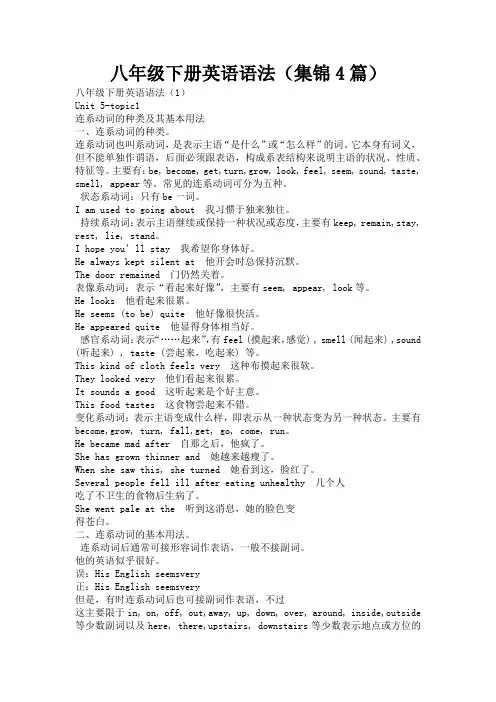
八年级下册英语语法(集锦4篇)八年级下册英语语法(1)Unit 5-topic1连系动词的种类及其基本用法一、连系动词的种类。
连系动词也叫系动词,是表示主语“是什么”或“怎么样”的词。
它本身有词义,但不能单独作谓语,后面必须跟表语,构成系表结构来说明主语的状况、性质、特征等。
主要有:be, become, get,turn,grow, look, feel, seem, sound, taste, smell, appear等。
常见的连系动词可分为五种。
状态系动词:只有be一词。
I am used to going about 我习惯于独来独往。
持续系动词:表示主语继续或保持一种状况或态度,主要有keep, remain,stay, rest, lie, stand。
I hope you’ll stay 我希望你身体好。
He always kept silent at 他开会时总保持沉默。
The door remained 门仍然关着。
表像系动词:表示“看起来好像”,主要有seem, appear, look等。
He looks 他看起来很累。
He seems (to be) quite 他好像很快活。
He appeared quite 他显得身体相当好。
感官系动词:表示“……起来”,有feel (摸起来,感觉) , smell (闻起来) ,sound (听起来) , taste (尝起来,吃起来) 等。
This kind of cloth feels very 这种布摸起来很软。
They looked very 他们看起来很累。
It sounds a good 这听起来是个好主意。
This food tastes 这食物尝起来不错。
变化系动词:表示主语变成什么样,即表示从一种状态变为另一种状态。
主要有become,grow, turn, fall,get, go, come, run。
He became mad after 自那之后,他疯了。
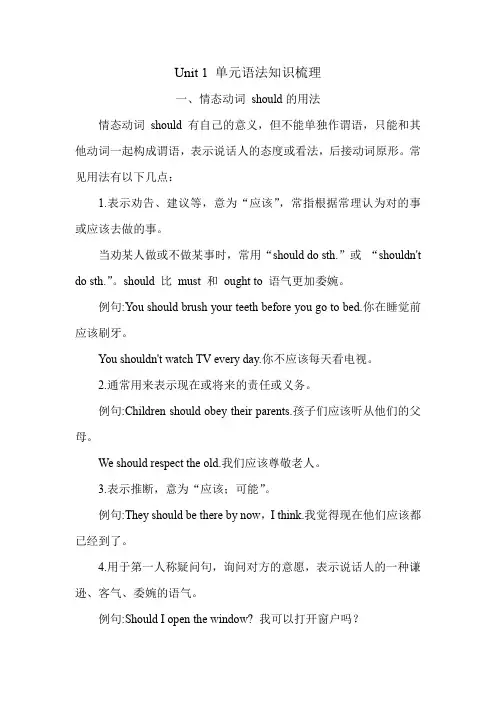
Unit 1 单元语法知识梳理一、情态动词should的用法情态动词should有自己的意义,但不能单独作谓语,只能和其他动词一起构成谓语,表示说话人的态度或看法,后接动词原形。
常见用法有以下几点:1.表示劝告、建议等,意为“应该”,常指根据常理认为对的事或应该去做的事。
当劝某人做或不做某事时,常用“should do sth.”或“shouldn't do sth.”。
should 比must 和ought to 语气更加委婉。
例句:You should brush your teeth before you go to bed.你在睡觉前应该刷牙。
You shouldn't watch TV every day.你不应该每天看电视。
2.通常用来表示现在或将来的责任或义务。
例句:Children should obey their parents.孩子们应该听从他们的父母。
We should respect the old.我们应该尊敬老人。
3.表示推断,意为“应该;可能”。
例句:They should be there by now,I think.我觉得现在他们应该都已经到了。
4.用于第一人称疑问句,询问对方的意愿,表示说话人的一种谦逊、客气、委婉的语气。
例句:Should I open the window? 我可以打开窗户吗?What should we do now? 我们现在该干什么呢?5.表示某种感情色彩,意为“竟会”,常用于以how, why开头引导的特殊疑问句中。
例句:Why should you be so early today? 你今天为什么会如此早?二、反身代词1.反身代词的构成反身代词是一种表示反射或强调的代词。
它由第一人称、第二人称的形容词性物主代词和第三人称代词的宾格加词尾-self或-selves构成。
其构成如下表:反身代词与它所指代的名词或代词形成互指关系,两者在人称和数上应保持一致。
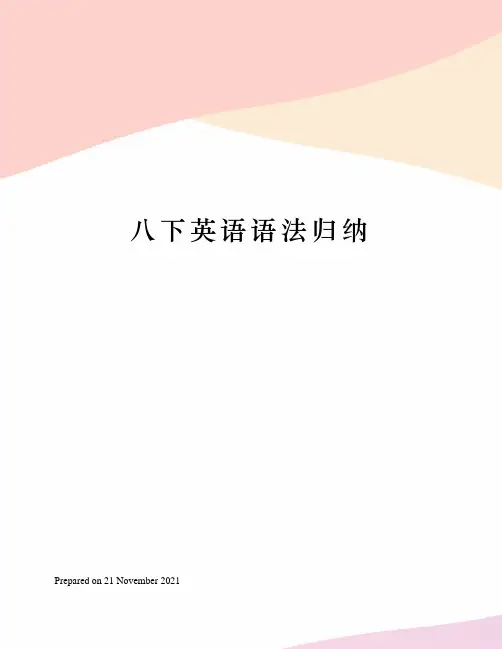
八下英语语法归纳Prepared on 21 November 2021新版八年级英语下册第一单元知识点归纳Unit 1 What’s the matter一、基础知识1. What’ s the matter 怎么啦出什么事情了【解析】matter/ ' mt(r)) /n.问题;事情What’ s the matter with you= What’s the trouble with you = What’ s wrong with you 你怎么了【注】: matter 和trouble 为名词,其前可加the 或形容词性物主代词,wrong 是adj. 不能加the【用法】用于询问某人有什么病或某人遇到什么麻烦、问题其后跟询问对象时,与介词with连用。
即:What’s the matter with sb. = What’s your trouble = What’s up = What happens to sb.—What’s the matter with you —I have a bad cold.2. I had a cold.我感冒了。
have a cold=catch a cold=have theflu感冒have a fever 发烧 have a cough咳嗽 have a stomachache胃疼,肚子疼 have a toothache牙疼 have a headache头疼3. 身体部位+ache(疼痛)构成新的复合词stomach+ache=stomachache head+ache=headachetooth+ache=toothache back+ache=backache后背痛4. much too+ 形容词,意为太...... ,too much+名词,意为很多,大量。
5. enough【形容、副词】足够的/地,enough放在名前后,形副后。
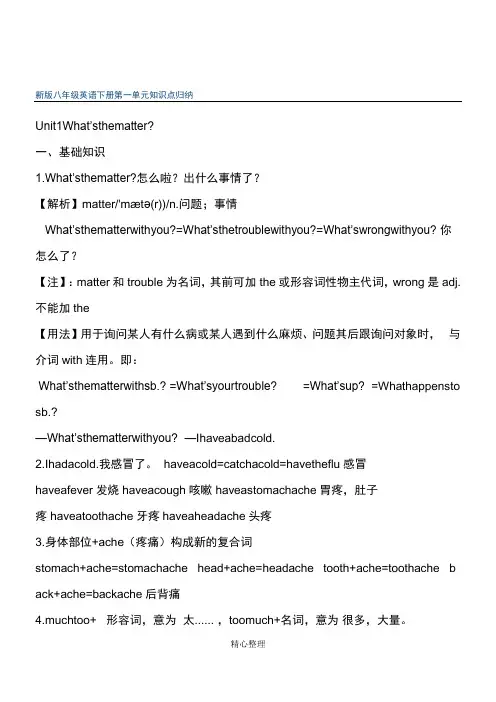
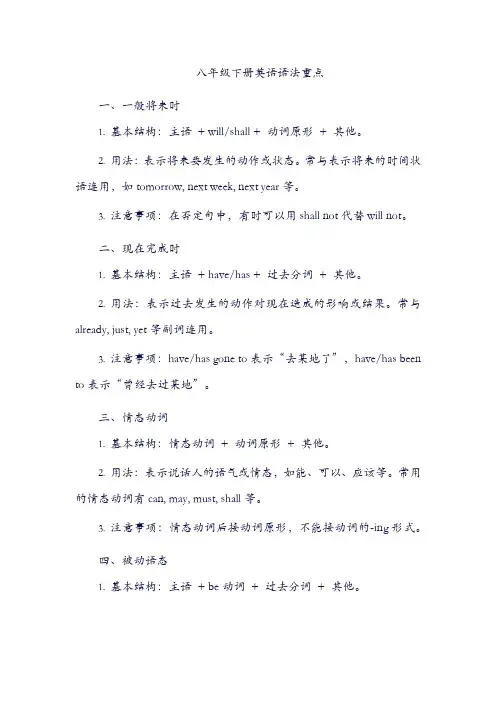
八年级下册英语语法重点一、一般将来时1.基本结构:主语+ will/shall + 动词原形+ 其他。
2.用法:表示将来要发生的动作或状态。
常与表示将来的时间状语连用,如tomorrow, next week, next year等。
3.注意事项:在否定句中,有时可以用shall not代替will not。
二、现在完成时1.基本结构:主语+ have/has + 过去分词+ 其他。
2.用法:表示过去发生的动作对现在造成的影响或结果。
常与already, just, yet等副词连用。
3.注意事项:have/has gone to表示“去某地了”,have/has been to表示“曾经去过某地”。
三、情态动词1.基本结构:情态动词+ 动词原形+ 其他。
2.用法:表示说话人的语气或情态,如能、可以、应该等。
常用的情态动词有can, may, must, shall等。
3.注意事项:情态动词后接动词原形,不能接动词的-ing形式。
四、被动语态1.基本结构:主语+ be动词+ 过去分词+ 其他。
2.用法:表示主语是动作的接受者。
常与by引导的方式状语连用,如by machine, by air等。
3.注意事项:被动语态的时态变化主要通过be动词的变化来实现,不同时态的被动语态需要注意与该时态的主动语态相对应。
五、不定代词和冠词用法1.不定代词:表示泛指或不确定的代词,如some, any, other等。
some用于肯定句,any用于否定句或疑问句;other表示“其他的”。
2.冠词:表示特指或泛指的词,分为定冠词the和不定冠词a/an。
a用于辅音音素开头的单词前,an用于元音音素开头的单词前;the 表示特指或上文提到的某个名词。
3.用法:不定代词和冠词一起使用时,可以构成限定词短语,如some books, the school gate等。
限定词短语可以修饰名词,表示特指或泛指的概念。
4.注意事项:在英语中,不定代词和冠词的使用是有规则和限制的,需要根据上下文和语境来判断使用哪个代词或冠词。
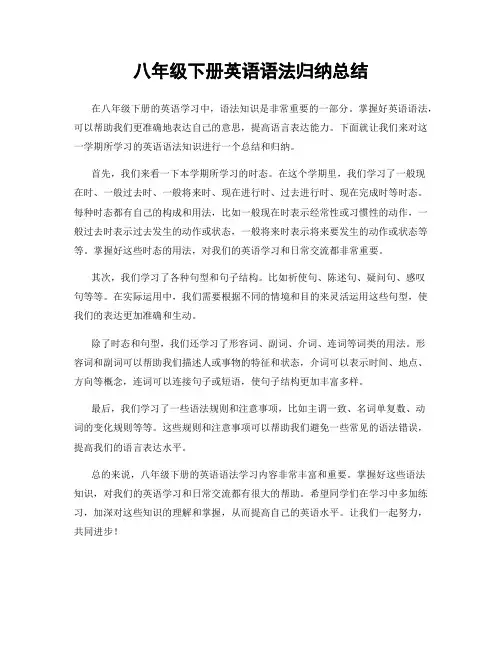
八年级下册英语语法归纳总结
在八年级下册的英语学习中,语法知识是非常重要的一部分。
掌握好英语语法,可以帮助我们更准确地表达自己的意思,提高语言表达能力。
下面就让我们来对这一学期所学习的英语语法知识进行一个总结和归纳。
首先,我们来看一下本学期所学习的时态。
在这个学期里,我们学习了一般现
在时、一般过去时、一般将来时、现在进行时、过去进行时、现在完成时等时态。
每种时态都有自己的构成和用法,比如一般现在时表示经常性或习惯性的动作,一般过去时表示过去发生的动作或状态,一般将来时表示将来要发生的动作或状态等等。
掌握好这些时态的用法,对我们的英语学习和日常交流都非常重要。
其次,我们学习了各种句型和句子结构。
比如祈使句、陈述句、疑问句、感叹
句等等。
在实际运用中,我们需要根据不同的情境和目的来灵活运用这些句型,使我们的表达更加准确和生动。
除了时态和句型,我们还学习了形容词、副词、介词、连词等词类的用法。
形
容词和副词可以帮助我们描述人或事物的特征和状态,介词可以表示时间、地点、方向等概念,连词可以连接句子或短语,使句子结构更加丰富多样。
最后,我们学习了一些语法规则和注意事项,比如主谓一致、名词单复数、动
词的变化规则等等。
这些规则和注意事项可以帮助我们避免一些常见的语法错误,提高我们的语言表达水平。
总的来说,八年级下册的英语语法学习内容非常丰富和重要。
掌握好这些语法
知识,对我们的英语学习和日常交流都有很大的帮助。
希望同学们在学习中多加练习,加深对这些知识的理解和掌握,从而提高自己的英语水平。
让我们一起努力,共同进步!。
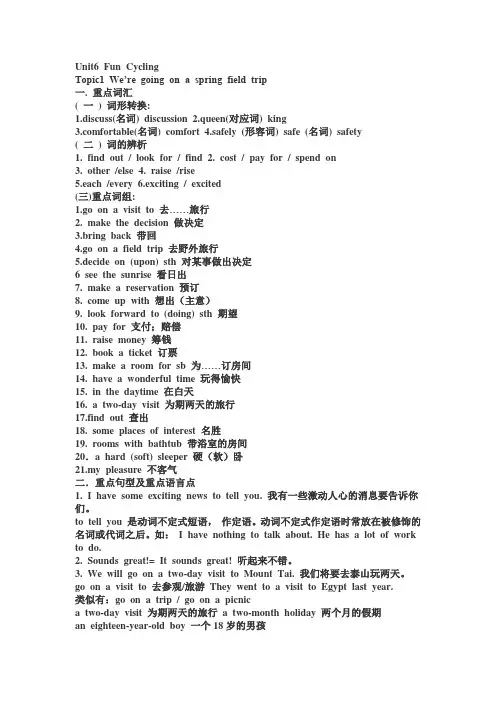
Unit6 Fun CyclingTopic1 We’re going on a spring field trip一. 重点词汇( 一) 词形转换:1.discuss(名词) discussion2.queen(对应词) kingfortable(名词) comfort4.safely (形容词) safe (名词) safety( 二) 词的辨析1. find out / look for / find2. cost / pay for / spend on3. other /else4. raise /rise5.each /every6.exciting / excited(三)重点词组:1.go on a visit to 去……旅行2. make the decision 做决定3.bring back 带回4.go on a field trip 去野外旅行5.decide on (upon) sth 对某事做出决定6 see the sunrise 看日出7. make a reservation 预订8. come up with 想出(主意)9. look forward to (doing) sth 期望10. pay for 支付;赔偿11. raise money 筹钱12. book a ticket 订票13. make a room for sb 为……订房间14. have a wonderful time 玩得愉快15. in the daytime 在白天16. a two-day visit 为期两天的旅行17.find out 查出18. some places of interest 名胜19. rooms with bathtub 带浴室的房间20.a hard (soft) sleeper 硬(软)卧21.my pleasure 不客气二.重点句型及重点语言点1. I have some exciting news to tell you. 我有一些激动人心的消息要告诉你们。
Unit 1第一部分:Grammar一、情态动词(Modal Verbs)情态动词should 意为“应该,应当”,必须和后面的动词原形一起构成谓语,没有人称和数的变化。
用以表达职责和义务、提出劝告,而且表述的是自己的主观看法。
注意:should 在以why,who,how 等疑问词开头的问句中,意为“竟然,居然,怎么会”,表示意外、惊喜或在说话人看来是不可思议的。
三、反身代词表示反射或强调的代词叫做反身代词。
反身代词是由第一人称、第二人称形容词性物主代词或第三人称代词的宾格形式,词尾加self 或selves 组成。
反身代词可译“本人”、“本身”,为加强语气,也常翻译为“亲自”、“自己”。
不定人称代词one ---- o neself.第二部分:单词用法Section A1.What’s the matter?怎么了?该句常用询问某人患了何种疾病或遇到了什么麻烦,其后用with 引出对象。
1). What’s the matter with sb.?=what’s wrong with sb.?=what’s the trouble/problem with sb.?=what’s one’s trouble/problem?e.g. What’s the matter w ith Tom?=what’s with Tom?=What’s the with Tom?=What’s Tom’s?2). matter, 名词,“问题,事情”e.g. We have important (matter) to discuss.我们有些重要的问题要讨论。
3). 动词,“要紧,关系重大”e.g. It dosen’t that you came late.2.I have a cold. 我感冒了。
1).have/get/catch a cold “感冒,着凉”The old man a cold yesterday.那位老人昨天感冒了。
八年级下册英语第二单元语法在八年级下册英语学习中,第二单元主要涉及时态的使用和一些基础的语法结构。
本单元的重点是过去进行时和过去完成时的用法。
我们将详细探讨这两种时态的结构、用法以及一些常见的错误,帮助同学们更好地掌握英语语法。
一、过去进行时1. 结构过去进行时的结构是“主语 + was/were + 动词-ing”。
其中,“was”用于单数主语,“were”用于复数主语。
- 例句:- I was reading a book.(我在读一本书。
)- They were playing soccer.(他们在踢足球。
)2. 用法过去进行时主要用于描述过去某一时间正在进行的动作。
一般情况下,这种时态用于:- 描述背景- 表达两个动作同时进行的情况- 例句:- While she was cooking, he was setting the table.(当她在做饭时,他在摆桌子。
)3. 注意事项- 有时学生在使用过去进行时的时候,会混淆“was/were”的使用,记住:主语是“I”、“he”、“she”、“it”时用“was”,其他情况一般用“were”。
- 例句中的动词必须加上-ing。
二、过去完成时1. 结构过去完成时的结构是“主语 + had + 过去分词”。
这个时态表示在过去某一时间之前已经完成的动作。
- 例句:- She had finished her homework before dinner.(她在晚餐之前完成了作业。
)- They had gone to the park before it started raining.(在开始下雨之前,他们已经去了公园。
)2. 用法过去完成时主要用于以下几种情况:- 表示一个动作在另一个过去的动作之前完成- 描述过去时切换时需要强调的背景信息- 例句:- After he had left, I realized I had forgotten my book.(在他离开之后,我意识到我忘了我的书。
八年级下册英语复合句语法知识点归纳总结复合句是由两个或更多的句子组成的句子。
下面是八年级下册英语复合句的一些常见语法知识点总结:1. 关系代词关系代词用来引导定语从句,常见的关系代词有:who, whom, whose, which, that。
关系代词在从句中作为主语、宾语、或定语。
例句:- The girl who is wearing a red dress is my sister.- This is the book that I borrowed from the library.2. 定语从句定语从句用来修饰名词或代词,给出更多的信息。
定语从句通常用关系代词引导。
例句:- The house where he was born is now a museum.3. 时间状语从句时间状语从句用来表示时间,通常由when, while, before, after, since, until等引导。
例句:- I will visit my grandparents when I have time.4. 原因状语从句原因状语从句用来表示原因,通常由because, since, as等引导。
例句:5. 结果状语从句结果状语从句用来表示结果,通常由so, such...that, so that等引导。
例句:- The weather was so cold that we couldn't go outside.6. 目的状语从句目的状语从句用来表示目的,通常由in order to, so as to等引导。
例句:- I study hard in order to pass the exam.7. 条件状语从句条件状语从句用来表示条件,通常由if, unless, as long as, provided that等引导。
例句:- If it rains, we will stay indoors.以上是八年级下册英语复合句的一些常见语法知识点。
八年级下英语基本句型及语法1.Kids will study at home on computers.表通过电脑、电视及广播等用介词on2.In ten years, I think I will be a reporter.In , after和later的区别in +时间段:与将来时连用He will be back in two hours.after +时间段:与过去时连用He came back after two hours.after +时间点:可与将来时连用He will be back after two o\'clock.later只能接在时间段之后,即可用于过去时也可用于将来时。
Some days later, he become well again.I will go back two days later.3. On the weekend, I will be able to dress more cusually.can , be able to.1)can表示“能力”时,和be able to相当,许多场合都可以互相替换。
但当叙述过去经过一番努力才能完成的事情或前面有特殊说明,表示你有能力时,只能用be able to。
Can you speak any foreign languages?=Are you able to speak any foreign languages?2).can 只能用于一般现在时和一般过去时,而be able to可用于各种时态。
No one could / was able to answer this question.When he grows up, he will be able to support his family.他长大后就能养家了。
Frank is ill. He hasn't been able to go to school for one week. 弗兰克病了,已经一周没去上学了。
八年级下册英语语法一. 时态英语中,时态表示动作发生的时间,分为三种主要时态:一般现在时、一般过去时和一般将来时。
•一般现在时:表示经常性、习惯性的动作或现实中的真理。
示例:–I drink coffee every morning.(我每天早上喝咖啡。
)–The sun rises in the east.(太阳从东方升起。
)•一般过去时:表示在过去某个时间发生的动作或存在的状态。
示例:–I watched a movie last night.(我昨晚看了一部电影。
)–She lived in London three years ago.(她三年前住在伦敦。
)•一般将来时:表示将来某个时间会发生的动作。
示例:–I will visit my grandparents next week.(下周我将会去探望我的祖父母。
)–They are going to travel to China next summer.(他们计划明年夏天去中国旅游。
)二. 语态英语中,动词的语态有两种:主动语态和被动语态。
•主动语态:表示主语是动作的执行者。
示例:–She wrote a letter.(她写了一封信。
)–They are washing the car.(他们正在洗车。
)•被动语态:表示主语是动作的承受者。
–The letter was written by her.(这封信是她写的。
)–The car is being washed by them.(这辆车正在被他们洗。
)被动语态的构成要素为:be动词的适当形式 + 过去分词。
三. 名词名词是英语中最基本的词类之一,用来指称人、事物、地点等。
•可数名词:可以用单数和复数两种形式表达的名词。
示例:–I have a cat.(我有一只猫。
)–They have two cars.(他们有两辆车。
)•不可数名词:只有单数形式,不能用复数形式。
–I need some information.(我需要一些信息。
八年级下册英语语法总结八年级下册英语语法总结Unit6 Fun CyclingTopic1 We’re going on a spring field trip一. 重点词汇( 一) 词形转换:1.discuss(名词) discussion2.queen(对应词) kingfortable(名词) comfort4.safely (形容词) safe (名词) safety( 二) 词的辨析1. find out / look for / find2. cost / pay for / spe nd on3. other /else4. raise /rise5.each /every6.exciting / excited(三)重点词组:1.go on a visit to 去……旅行2. make the decision 做决定3.bring back 带回4.go on a field trip 去野外旅行5.decide on (upon) sth 对某事做出决定6 see the sunrise 看日出7. make a reservation 预订8. come up with 想出(主意)9. look forward to (doing) sth 期望10. pay for 支付;赔偿11. raise money 筹钱12. book a ticket 订票13. make a room for sb 为……订房间14. have a wonderful time 玩得愉快15. in the daytime 在白天16. a two-day visit 为期两天的旅行17.find out 查出18. some places of interest 名胜19. rooms with bathtub 带浴室的房间20.a hard (soft) sleeper 硬(软)卧21.my pleasure 不客气二.重点句型及重点语言点1. I have some exciting news to tell you. 我有一些激动人心的消息要告诉你们。
to tell you 是动词不定式短语,作定语。
动词不定式作定语时常放在被修饰的名词或代词之后。
如:I have nothi ng to talk about. He has a lot of work to do.2. Sounds great!= It sounds great! 听起来不错。
3. We will go on a two-day visit to Mount Tai. 我们将要去泰山玩两天。
go on a visit to 去参观/旅游They went to a visit t o Egypt last year.类似有:go on a trip / go on a picnica two-day visit 为期两天的旅行a two-month holiday 两个月的假期an eighteen-year-old boy 一个18岁的男孩4.It’s hard to say. 这很难说。
To say 是动词不定式作主语,It 是形式主语。
如:It’s nice to meet you.5. I’ll ask the airline on the phone. 我将打电话问问航空公司。
同义句是:I’ll phone and ask the airline.6. Bring back your information to class tomorrow and we’ll decide on the best way to go on our fi eld trip. 明天把你们查到的信息带到班上来,然后我们来决定最好的郊游方式。
bring back 带回。
Please bring back your library boo ks tomorrow.decide on/upon sth 决定,选定We’re tryin g to de cide on a school.7.It’s too far for cycling. 骑自行车去路太远了。
同义句是:It’ too far to cycle there.8.How long does it take to reach Mount Tai by…?乘……去泰山要花多长时间?9.How much does it cost to go there ?去那里要花多少钱?How much does a standard room cost ? 一个标准间的价格是多少?10.We have tickets at 120 yuan for the hard sleep er and 180 yuan for the soft sleeper.我们的票价是硬卧120元,软卧是180元。
at 意为“以……”,一般用于表示价格,年龄,速度等词的前面,for 意为“供,适合于”。
I’ve got tickets at 80 yuan for The Sound of Music.11.I’d like to book 20 tickets for the hard sleeper.我要预订20张硬卧票。
20 tickets for the hard sleeper= 20 hard sleeper ti cketsbook tickets 预订票book a room for sb/sth 为……预订房间e.g. We want to book some rooms for 14th. 我们想预订一些14号的房间。
12.Please pay for the tickets before 5:30 p.m. 请在下午5:30之前付款。
Pay for 支付pay for sb to do sth 付钱给某人做某事e.g. Her parents paid for her to go to America.她的父母支付她去美国的费用.13. I want to make a hotel reservation. 我想预订房间。
make a reservation 预订14. We have rooms with a bathtub… 我们有带浴缸……的房间。
with 有或带着a house with a swimming poola standard room with two single beds15.It’s very common to raise money in Canadian and American schools. 在加拿大和美国的学校里筹钱是很正常的。
raise money 筹钱We can raise the mone y ourselves.16.It costs each student one dollar to buy a ticket for the draw.每一个学生花一美元便可买到一张抽奖的票。
(1)each 作主语,谓语用单数Each of the students spe nds one dollar buying a ticket.. (2)用于单数名词前,作定语,谓语用单数。
Each student has their own e-mail address.(3)用于复数主语后,作主语同位语,谓语用复数。
They ea ch have their own e-mail address.17. I am looking forward to hearing from you . 我盼望收到你的来信。
Look forward to 盼望,期待They are looking forward to solving the problem.三.重点语法动词不定式(1)动词不定式常跟这些及物动词之后,want ,refuse, f orget, need , try, learn , like, agree, help, hope ,de cide, begin等。
可用顺口溜(要想拒绝忘记,需要努力学习,喜欢同意帮助,希望决定开始)(2)不定式的否定形式是在to的前面直接加not. My m other decided not to buy a computer for me.(3)不定式可以和疑问词who , which ,when, where , how, what等连用。
Can you tell me what to say at the meeting ? I don’t know how to get to the st ation.(4)本topic出现的句子有:I have some exciting news to tell you.I want to make a hotel reservation.It is very common to raise money in Canadian and American schools.The best way to raise money is to sell newspapers.I think the most exciting way is to sell flowers in the evening.Kangkang helped us to book the train tickets.Topic2 How about exploring the Ming Tombs ?一、重点词汇:(一)词形转换:1.explore(名词) explore2. east (形容词) eastern3.north(形容词) northern4. push (反义词) pull5.sadly(形容词) sad (名词) sadness6. crowd (形容词) crowded(二)重点词组:1.make a plan 拟定计划2. make sure 确信,确保3. come along with 和……一起来4. at the foot of 在……的脚下5. be surprised at 对……感到惊奇6. be satisfied with 对……感到满意7. out of sight 看不见8. step on one’s toes 踩着某人的脚9. can’t help doing sth 忍不住做某事10. spread over 分布于11.rush out 冲出去12.raise one’s head 抬头13.ask sb for help 向某人求助14.thank goodness 谢天谢地二.重点句型及重点语言点1. While you were enjoying your trip, I was busy p reparing for my exams.当你在旅行时,我正忙于准备考试。